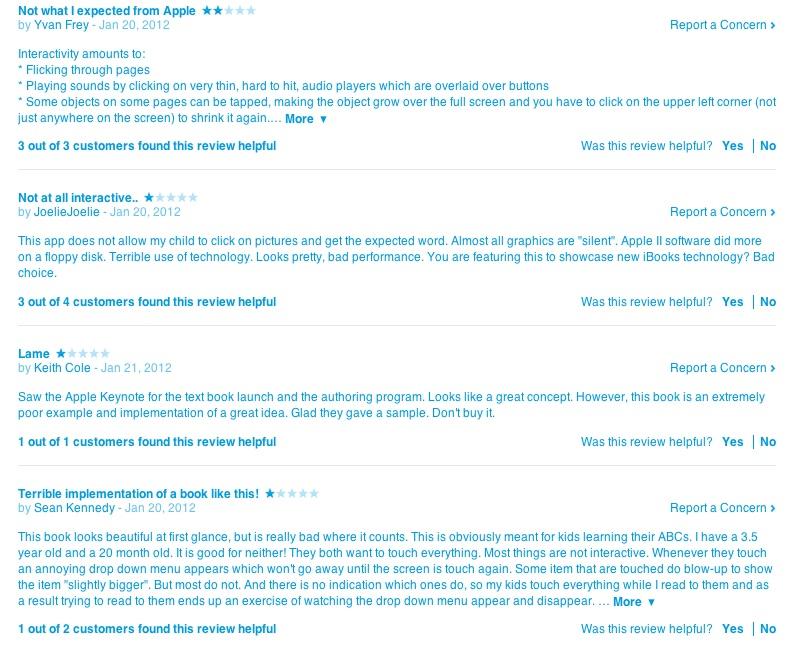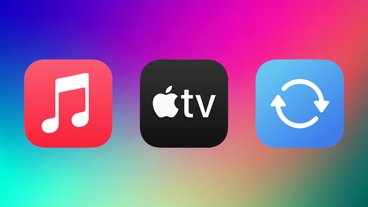Initial iBook 2 titles offer disappointing interactivity
Disappointing initial results from Old Media
Slader, a collaborative online educational service that provides academic resources for high school students, compared conventional textbooks with the initial iBooks offered by the same publishers and noted, "It’s akin to reading a PDF copy of the printed textbooks that exist in classrooms today. The interactive features promised are virtually nonexistent. Beyond the usual iPad features (highlighting and in-page definitions), there’s nothing new included in the publishers’ math iBooks."
The site added, "Provided with the opportunity and tools to create a ground-breaking learning experience for students, the established textbook companies took an easy route. Given first dibs at a new, revolutionary platform, they chose to push the same stale content."
It then concluded, "the most exciting piece of Apple’s announcement this past week revolves around the ability for anyone to author a textbook; Apple has provided the tools and distribution network to develop content that far surpasses the current offerings. New authors could easily exceed the publishers’ low standards. Is that enough to shake up the textbook market?"
Individual reviews of iBookstore textbooks also conveyed a general disappointment. "Pretty poor showing for a launch of the new interactive iBooks," one reviewer complained about DK's "My First ABC" title for children. "I can't believe this is the poster child for interactive book debut. There's nothing to interact with!" another said.
A red flag for conventional book publishers
The initial iPhone apps that debuted in the App Store in 2008 and the first iPad apps introduced in 2010 were both largely impressive right from the start. The difference here is that iBooks are being created by non-programmers who are accustomed to creating books, and particularly books that have limited competition in a market that doesn't change very quickly.
That suggests conventional book publishers have more in common with the music labels and movie studios, who hesitantly tiptoed into iTunes with the horrified terror of a cat being forced to take a bath. Software developers, in contrast, pounded on Apple's door to demand that it let them make cool software.
This further suggests that, while Apple can eventually turn the publishing industry into a modern industry capable of delivering innovative, dynamic content, the company also has the potential to expand the technology behind iBooks Author to deliver more general purpose titles, ranging from comic books to fiction to even subscription content along the lines of magazines and blogs.
Apple focused on delivering subscription content for iPad users last year, but it targeted setting up a business model for publishers rather than giving them the tools to develop their content. The result was that publishers attempted to deliver static PDFs, exported Flash content, or essentially giant photos of their magazine pages, rather than investing the effort to actually develop dynamic new content.
Amazon has experienced similarly problems in trying to push publishers to deliver dynamic, interactive subscription content for its Kindle platform, with many reviews of the Kindle Fire complaining that magazine content was virtually unusable on the device.
The company's initial focus on producing high school textbooks makes the most sense for an initial effort, but after gaining a foothold, Apple appears poised to revolutionize how interactive publishing is done, taking a clear swipe at Adobe.
Segment three looks at how iBooks threatens to leverage web standards to not only replace Flash, but also to replace conventional page layout with dynamic, web-based technologies.
 Daniel Eran Dilger
Daniel Eran Dilger











 Mike Wuerthele
Mike Wuerthele

 Malcolm Owen
Malcolm Owen
 Chip Loder
Chip Loder

 William Gallagher
William Gallagher
 Christine McKee
Christine McKee
 Michael Stroup
Michael Stroup







